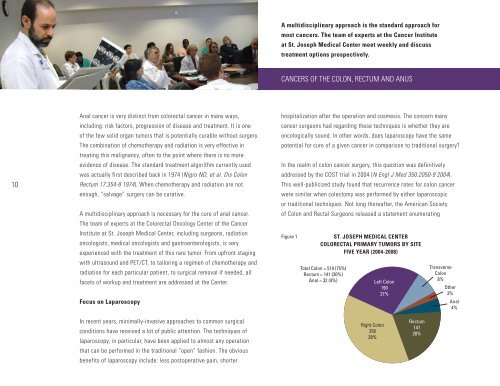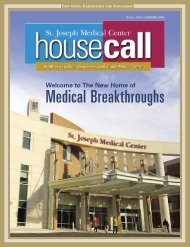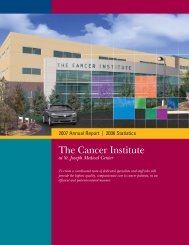A NEW DAY IN CANCER TREATMENT - St. Joseph Medical Center
A NEW DAY IN CANCER TREATMENT - St. Joseph Medical Center
A NEW DAY IN CANCER TREATMENT - St. Joseph Medical Center
- No tags were found...
You also want an ePaper? Increase the reach of your titles
YUMPU automatically turns print PDFs into web optimized ePapers that Google loves.
A multidisciplinary approach is the standard approach formost cancers. The team of experts at the Cancer Instituteat <strong>St</strong>. <strong>Joseph</strong> <strong>Medical</strong> <strong>Center</strong> meet weekly and discusstreatment options prospectively.<strong>CANCER</strong>S OF THE COLON, RECTUM AND ANUS10Anal cancer is very distinct from colorectal cancer in many ways,including: risk factors, progression of disease and treatment. It is oneof the few solid organ tumors that is potentially curable without surgery.The combination of chemotherapy and radiation is very effective intreating this malignancy, often to the point where there is no moreevidence of disease. The standard treatment algorithm currently usedwas actually first described back in 1974 (Nigro ND, et al. Dis ColonRectum 17:354-8 1974). When chemotherapy and radiation are notenough, “salvage” surgery can be curative.A multidisciplinary approach is necessary for the cure of anal cancer.The team of experts at the Colorectal Oncology <strong>Center</strong> of the CancerInstitute at <strong>St</strong>. <strong>Joseph</strong> <strong>Medical</strong> <strong>Center</strong>, including surgeons, radiationoncologists, medical oncologists and gastroenterologists, is veryexperienced with the treatment of this rare tumor. From upfront stagingwith ultrasound and PET/CT, to tailoring a regimen of chemotherapy andradiation for each particular patient, to surgical removal if needed, allfacets of workup and treatment are addressed at the <strong>Center</strong>.Focus on Laparoscopyhospitalization after the operation and cosmesis. The concern manycancer surgeons had regarding these techniques is whether they areoncologically sound. In other words, does laparoscopy have the samepotential for cure of a given cancer in comparison to traditional surgery?In the realm of colon cancer surgery, this question was definitivelyaddressed by the COST trial in 2004 (N Engl J Med 350:2050-9 2004).This well-publicized study found that recurrence rates for colon cancerwere similar when colectomy was performed by either laparoscopicor traditional techniques. Not long thereafter, the American Societyof Colon and Rectal Surgeons released a statement enumeratingFigure 1ST. JOSEPH MEDICAL CENTERCOLORECTAL PRIMARY TUMORS BY SITEFIVE YEAR (2004-2008)Total Colon = 519 (75%)Rectum = 141 (20%)Anal = 32 (4%)Left Colon19027%TransverseColon8%Other3%Anal4%In recent years, minimally-invasive approaches to common surgicalconditions have received a lot of public attention. The techniques oflaparoscopy, in particular, have been applied to almost any operationthat can be performed in the traditional “open” fashion. The obviousbenefits of laparoscopy include: less postoperative pain, shorterRight Colon25838%Rectum14120%
















